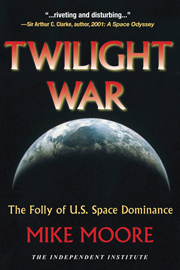William Lynn, President Barack Obama’s nominee for Deputy Secretary of Defense, vowed to make the Pentagon’s missile defense system “cost-effective” during his confirmation hearing earlier this month before the Senate Armed Services Committee. Indeed, missile defense strikes a lot of national security analysts as a frightful waste of money.
Money is not the central issue, though. The pros and cons of missile defense are endlessly complex, and men and women in the national security community understand these subtleties. Some are pro-missile defense; some are not; others say the current system won’t work, but another kind would. Still others question the assumption that a rogue nation would ever send a nuclear-armed missile our way—with its return address effectively written all over it—knowing that U.S. retaliation would be swift and devastating. Vans or trucks would be a more likely means of delivery, with weapons components smuggled in and assembled in garages.
Such subtleties are missing from the manner in which missile defense advocates market their cause. Case in point: the teaser for the Heritage Foundation’s forthcoming documentary film, 33 Minutes, part of a new and extensive pro-missile defense campaign. The teaser features Arabic music, missile launches, and nuclear explosions. At one point we watch a teeming-with-vitality montage of New York City street life. “Less than 33 minutes away,” intones Dr. Edwin Feulner, president of Heritage, “their whole city, their whole life could be annihilated.”
Scare tactics have long been used to persuade the American people to side with missile defense. During the 1980s, it was the Soviet Union that was threatening nuclear Armageddon; now it is rogue nations and even terrorists. China, which for years has supported the U.S. economy by helping to “cover” our annual budget deficits through the purchase of hundreds of billions of dollars of U.S. Treasury notes, is depicted as a Missile Menace. The Middle Kingdom, says Frank Gaffney, a hugely influential missile defense advocate, “is inexorably building up ever-larger numbers of missiles. Increasingly, these are capable not only of intimidating Taiwan but also of attacking the United States.”
Gaffney, president of the Center for Security Policy, and the Heritage Foundation are not alone in championing ballistic missile defense: hardline think tanks favor it, as do many editorial writers, columnists, TV talking heads, and—for that matter—ordinary people. And why not? How could anything labeled “defense” be anything but a Good Thing?
In the real world, though, labels and promotional materials are often misleading. Missile defense is widely perceived elsewhere in the world, even by U.S. friends and allies, as dangerously provocative. The infrastructure for a ballistic missile defense system is, in large measure, the same as that needed for an offensive anti-satellite system.
Meanwhile, the United States is the only nation that says it intends to develop the means to militarily dominate space—according to international law the “province of all mankind.” Given that, U.S. missile-defense systems capable of offense look a little sinister, particularly in the light that the United States has vetoed, since 1981, any serious attempt to negotiate a treaty designed to prevent a space-related arms race.
What is the world’s hyperpower really up to? The cover of the March 12, 2001, issue of The New Republic said it best: “Missile defense isn’t really meant to protect America. It’s a tool for global dominance. And that’s why we need it.”
If missile defense systems can be made reliable, goes the argument, America’s ability to militarily intervene anywhere at any time will be greatly enhanced. War games have demonstrated time and again that the United States can be deterred from military intervention if the target state has the ability to retaliate with nuclear weapons. A workable missile defense system would cure that defect. As Lawrence F. Kaplan, the brilliant neoconservative author of The New Republic story, said: missile defense is mainly about the ability to “project” military force globally.
That is not an idiosyncratic observation. The link between missile defense and military intervention is part of the intellectual mix when national security experts get together behind closed doors. That insight needs to be part of the public discussion, too. Our propensity for military intervention—as in, for instance, Iraq—touches upon the very meaning of America.
Can anyone spell “global hegemony”?







